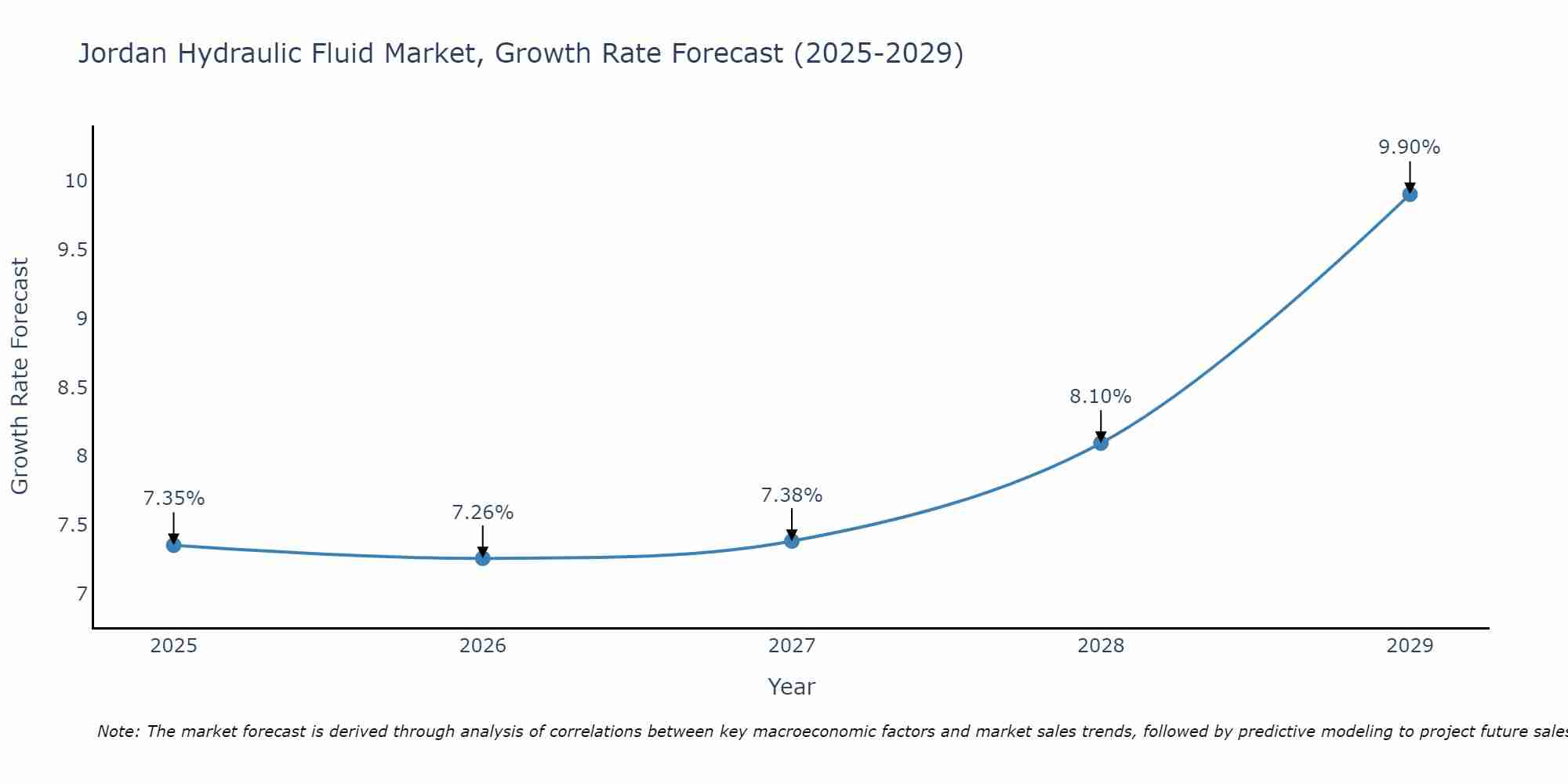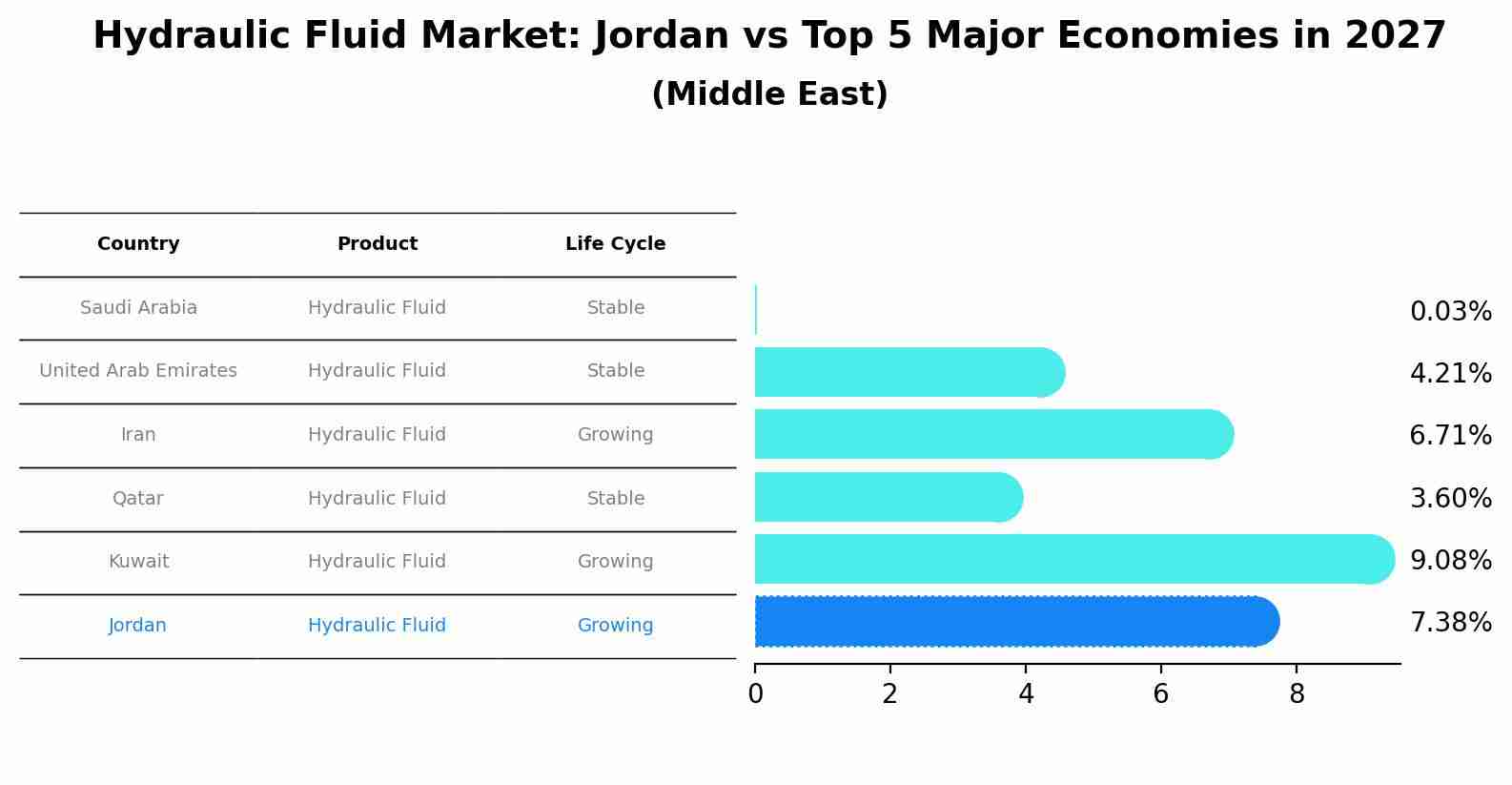Jordan Hydraulic Fluid Market (2025-2031) Outlook | Growth, Trends, Share, Size, Companies, Revenue, Value, Industry, Forecast & Analysis
| Product Code: ETC365146 | Publication Date: Aug 2022 | Updated Date: Aug 2025 | Product Type: Market Research Report | |
| Publisher: 6Wresearch | Author: Shubham Padhi | No. of Pages: 75 | No. of Figures: 35 | No. of Tables: 20 |
Jordan Hydraulic Fluid Market Size Growth Rate
The Jordan Hydraulic Fluid Market is projected to witness mixed growth rate patterns during 2025 to 2029. Commencing at 7.35% in 2025, growth builds up to 9.90% by 2029.

Hydraulic Fluid Market: Jordan vs Top 5 Major Economies in 2027 (Middle East)
In the Middle East region, the Hydraulic Fluid market in Jordan is projected to expand at a growing growth rate of 7.38% by 2027. The largest economy is Saudi Arabia, followed by United Arab Emirates, Iran, Qatar and Kuwait.

Jordan Hydraulic Fluid Market Overview
In Jordan, the hydraulic fluid market is witnessing steady growth due to the demand from various industrial sectors, including manufacturing, construction, and automotive. Hydraulic fluids are critical for the operation of hydraulic systems, providing lubrication and power transmission. The market is driven by industrial expansion, modernization of machinery, and the need for high-performance fluids.
Drivers of the market
The hydraulic fluid market in Jordan is growing due to the expanding industrial and construction sectors, which require efficient and reliable hydraulic systems. The demand for high-performance hydraulic fluids that ensure the smooth operation of machinery and equipment is a key driver. Additionally, the increasing focus on reducing environmental impact and improving energy efficiency in industrial operations supports the adoption of advanced hydraulic fluids.
Challenges of the market
The hydraulic fluid market in Jordan faces challenges related to product quality and environmental regulations. Ensuring the availability of high-quality hydraulic fluids that meet industry standards can be difficult, especially given the presence of low-cost, substandard products in the market. Additionally, there is increasing pressure to develop environmentally friendly hydraulic fluids that comply with local and international environmental regulations. The market also contends with the need for proper disposal and recycling of used hydraulic fluids, which can be costly and logistically challenging. Furthermore, there is a need for greater awareness and education about the importance of using high-quality hydraulic fluids to ensure the longevity and efficiency of hydraulic systems.
Government Policy of the market
The Jordan government has introduced policies to regulate the hydraulic fluid market, focusing on environmental protection and product safety. These policies include standards for fluid composition, disposal regulations to prevent environmental contamination, and incentives for the development of eco-friendly hydraulic fluids. The government`s commitment to sustainability and industrial safety is reflected in these regulatory measures.
Key Highlights of the Report:
- Jordan Hydraulic Fluid Market Outlook
- Market Size of Jordan Hydraulic Fluid Market, 2024
- Forecast of Jordan Hydraulic Fluid Market, 2031
- Historical Data and Forecast of Jordan Hydraulic Fluid Revenues & Volume for the Period 2021-2031
- Jordan Hydraulic Fluid Market Trend Evolution
- Jordan Hydraulic Fluid Market Drivers and Challenges
- Jordan Hydraulic Fluid Price Trends
- Jordan Hydraulic Fluid Porter's Five Forces
- Jordan Hydraulic Fluid Industry Life Cycle
- Historical Data and Forecast of Jordan Hydraulic Fluid Market Revenues & Volume By Base Oil for the Period 2021-2031
- Historical Data and Forecast of Jordan Hydraulic Fluid Market Revenues & Volume By Synthetic Oil for the Period 2021-2031
- Historical Data and Forecast of Jordan Hydraulic Fluid Market Revenues & Volume By Mineral Oil for the Period 2021-2031
- Historical Data and Forecast of Jordan Hydraulic Fluid Market Revenues & Volume By Bio-based Oil for the Period 2021-2031
- Historical Data and Forecast of Jordan Hydraulic Fluid Market Revenues & Volume By End Use for the Period 2021-2031
- Historical Data and Forecast of Jordan Hydraulic Fluid Market Revenues & Volume By Oil & Gas for the Period 2021-2031
- Historical Data and Forecast of Jordan Hydraulic Fluid Market Revenues & Volume By Marine for the Period 2021-2031
- Historical Data and Forecast of Jordan Hydraulic Fluid Market Revenues & Volume By Automotive for the Period 2021-2031
- Historical Data and Forecast of Jordan Hydraulic Fluid Market Revenues & Volume By Aerospace & defense for the Period 2021-2031
- Historical Data and Forecast of Jordan Hydraulic Fluid Market Revenues & Volume By Construction for the Period 2021-2031
- Historical Data and Forecast of Jordan Hydraulic Fluid Market Revenues & Volume By Others for the Period 2021-2031
- Jordan Hydraulic Fluid Import Export Trade Statistics
- Market Opportunity Assessment By Base Oil
- Market Opportunity Assessment By End Use
- Jordan Hydraulic Fluid Top Companies Market Share
- Jordan Hydraulic Fluid Competitive Benchmarking By Technical and Operational Parameters
- Jordan Hydraulic Fluid Company Profiles
- Jordan Hydraulic Fluid Key Strategic Recommendations
Frequently Asked Questions About the Market Study (FAQs):
- Single User License$ 1,995
- Department License$ 2,400
- Site License$ 3,120
- Global License$ 3,795
Search
Related Reports
- Australia IT Asset Disposal Market (2025-2031) | Strategy, Consumer Insights, Analysis, Investment Trends, Opportunities, Growth, Size, Share, Industry, Revenue, Segments, Value, Segmentation, Supply, Forecast, Restraints, Outlook, Competition, Drivers, Trends, Demand, Pricing Analysis, Competitive, Strategic Insights, Companies, Challenges
- UAE Building Thermal Insulation Market Outlook (2025-2031) | Revenue, Companies, Share, Trends, Growth, Size, Forecast, Industry, Analysis & Value
- Portugal Electronic Document Management Market (2025-2031) | Strategy, Consumer Insights, Analysis, Investment Trends, Opportunities, Growth, Size, Share, Industry, Revenue, Segments, Value, Segmentation, Supply, Forecast, Restraints, Outlook, Competition, Drivers, Trends, Demand, Pricing Analysis, Competitive, Strategic Insights, Companies, Challenges
- France Electronic Document Management Market (2025-2031) | Strategy, Consumer Insights, Analysis, Investment Trends, Opportunities, Growth, Size, Share, Industry, Revenue, Segments, Value, Segmentation, Supply, Forecast, Restraints, Outlook, Competition, Drivers, Trends, Demand, Pricing Analysis, Competitive, Strategic Insights, Companies, Challenges
- Portugal Occupational Health & Safety Services Market (2025-2031) | Strategy, Consumer Insights, Analysis, Investment Trends, Opportunities, Growth, Size, Share, Industry, Revenue, Segments, Value, Segmentation, Supply, Forecast, Restraints, Outlook, Competition, Drivers, Trends, Demand, Pricing Analysis, Competitive, Strategic Insights, Companies, Challenges
- Netherlands Occupational Health and Safety Services Market (2025-2031) | Strategy, Consumer Insights, Analysis, Investment Trends, Opportunities, Growth, Size, Share, Industry, Revenue, Segments, Value, Segmentation, Supply, Forecast, Restraints, Outlook, Competition, Drivers, Trends, Demand, Pricing Analysis, Competitive, Strategic Insights, Companies, Challenges
- Belgium and Luxembourg Facility Management Market (2025-2031) | Strategy, Consumer Insights, Analysis, Investment Trends, Opportunities, Growth, Size, Share, Industry, Revenue, Segments, Value, Segmentation, Supply, Forecast, Restraints, Outlook, Competition, Drivers, Trends, Demand, Pricing Analysis, Competitive, Strategic Insights, Companies, Challenges
- Russia Women Intimate Apparel Market (2025-2031) | Strategy, Consumer Insights, Analysis, Investment Trends, Opportunities, Growth, Size, Share, Industry, Revenue, Segments, Value, Segmentation, Supply, Forecast, Restraints, Outlook, Competition, Drivers, Trends, Demand, Pricing Analysis, Competitive, Strategic Insights, Companies, Challenges
- Africa Chocolate Market (2025-2031) | Size, Share, Trends, Growth, Revenue, Analysis, Forecast, industry & Outlook
- Global Hydroxychloroquine And Chloroquine Market (2025-2031) | Industry, Trends, Size, Outlook, Growth, Value, Companies, Revenue, Analysis, Share, Forecast
Industry Events and Analyst Meet
Our Clients
Whitepaper
- Middle East & Africa Commercial Security Market Click here to view more.
- Middle East & Africa Fire Safety Systems & Equipment Market Click here to view more.
- GCC Drone Market Click here to view more.
- Middle East Lighting Fixture Market Click here to view more.
- GCC Physical & Perimeter Security Market Click here to view more.
6WResearch In News
- Doha a strategic location for EV manufacturing hub: IPA Qatar
- Demand for luxury TVs surging in the GCC, says Samsung
- Empowering Growth: The Thriving Journey of Bangladesh’s Cable Industry
- Demand for luxury TVs surging in the GCC, says Samsung
- Video call with a traditional healer? Once unthinkable, it’s now common in South Africa
- Intelligent Buildings To Smooth GCC’s Path To Net Zero













